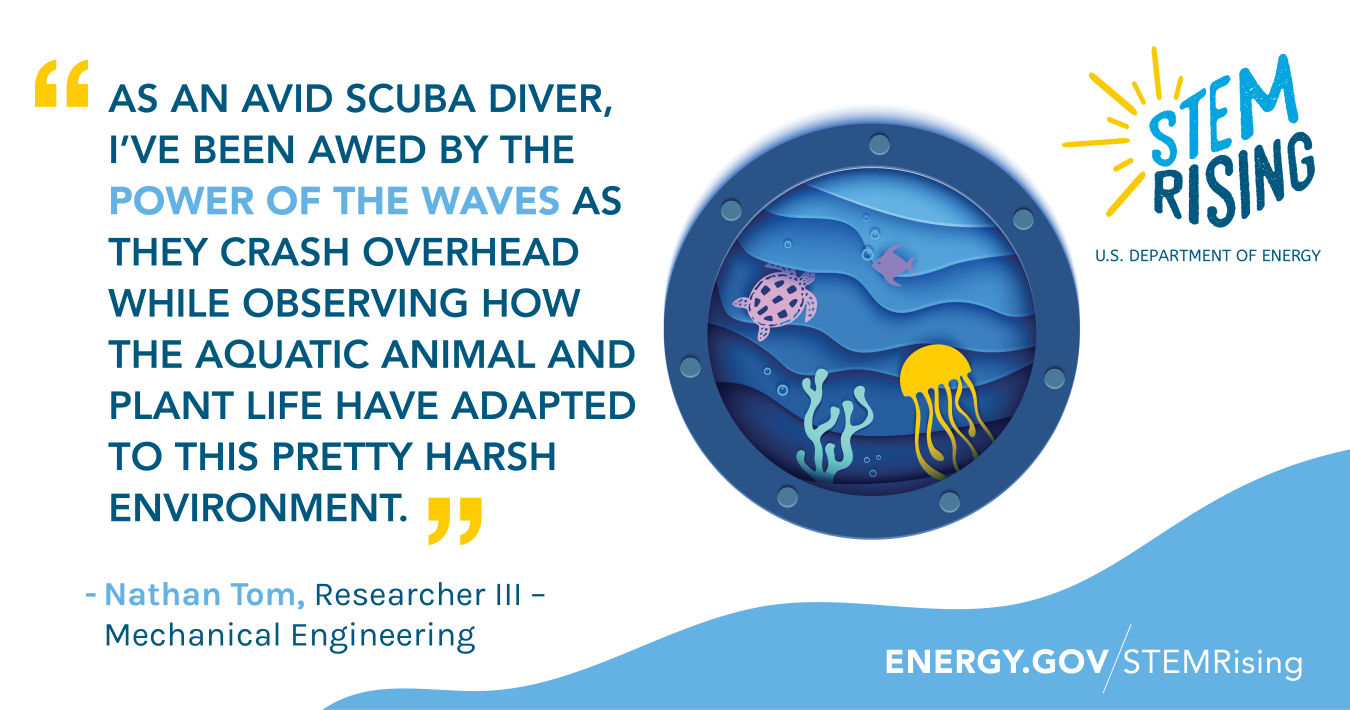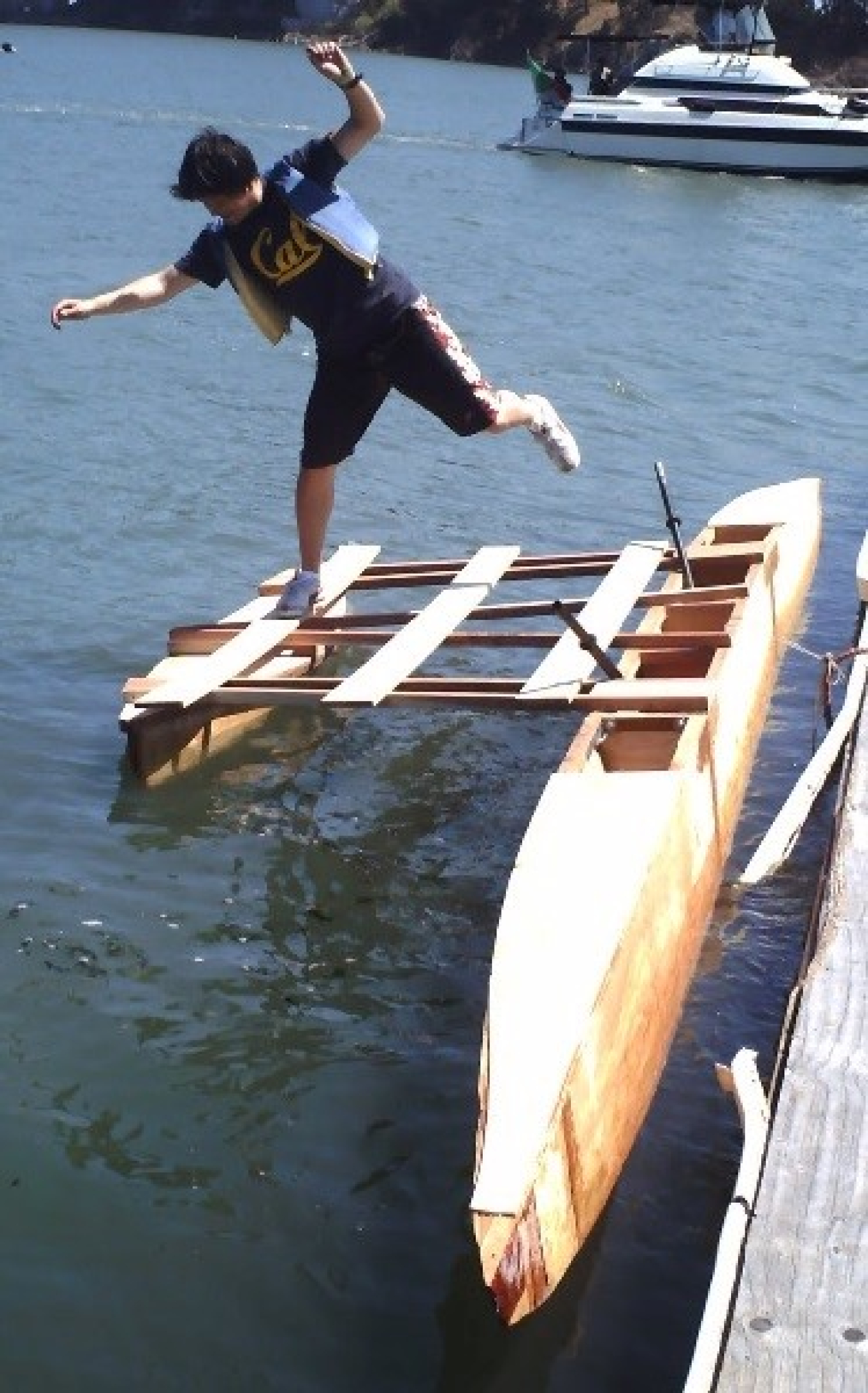Learn why Nathan Tom loves his job in mechanical engineering with the National Renewable Energy Laboratory's Wave to Energy Converter work.
June 22, 2020
June is Ocean Month, and to celebrate STEM Rising is sharing profiles of Energy Department staff in ocean-related careers. Meet Nathan Tom.
Nathan Tom grew up in San Jose, CA which is only an hour away from the popular coastal cities of Santa Cruz and Monterrey. Nathan completed his undergraduate and graduate education at the University of California, Berkeley. At Berkeley, he majored in mechanical engineering before transitioning to ocean engineering in graduate school, where he studied floating body motion and how it applies to wave energy converters (WECs). After graduating with his Ph.D., Nathan joined the water power team at the National Renewable Energy Laboratory where he has focused on WEC development.
What’s your favorite fact about the ocean?

The fact that 70 percent of the Earth’s surface is covered by oceans and its deepest point is about 36,000 ft. (which is deeper than Everest is tall)! When you imagine that vastness of space underneath the water you quickly realize why roughly 95% of the ocean still has yet to be explored. Just like flying though the air one can glide through the ocean depths!
What do you do to celebrate Ocean Month?
It is a bit strange to be in Colorado when researching ocean renewable energy technologies (as we are in the middle of the country) but that doesn’t mean we still can’t appreciate and protect our oceans! To be honest, there isn’t a specific activity that I complete or celebrate during ocean month, rather I try to participate in activites throughout the year that promote ocean awareness and protection. For example, participating in the International Coastal Cleanup Day or volunteering at the National Ocean Sciences Bowl!
What inspired you to work in water power?
One of the reasons I enjoy my work is my love for our world’s oceans and marine ecosystems. Growing up in San Jose, California, I was only about an hour away from the coast and made several trips with my family to visit the Monterrey Bay Aquarium and the local tide pools which helped me learn about the power of the oceans and the amount of life it holds. As an avid scuba diver, I’ve been awed by the power of the waves as they crash overhead while observing how the aquatic animal and plant life have adapted to this pretty harsh environment. I’ve felt the power of the waves that can be used to power our cities and offshore sensors that can help monitor and protect our marine enrironments.
What do you do in your job?
My job focuses on marine energy and our attempts to model the motion of floating objects in the ocean, such as wave energy converters or offshore wind turbines. One of my current projects is investigating the possibility of wave energy converters to change their shape in the ocean to adapt to different sea conditions with the goal of improving survivability. I hope my research will be used to design future wave farms where there are hundreds of devices powering our cities.
What books or movies about the ocean do you recommend?
A classic is of course Jules Verne’s 2,000 Leagues Under the Sea, which, despite being published in 1870, holds up surprisingly well in terms of scientific ideas!
For documentaries, one of the best is The Blue Planet! Being a fan of series like Planet Earth, the cinematography and opportunity to see some rare ocean creatures is amazing!
I think pursuing an ocean-related career will open a lot of opportunities to support the Blue Economy. There are a wide range of careers that support the sustainable use of our ocean resourses while providing jobs and maintaining the health of the oceans. These jobs can include renewable energy, tourism, fisheries, maritime transport, climate change mitigation, and even waste management. In addition, these jobs will need engineers, scientists, lawyers, skilled workers, etc. So, if you are passionate about the oceans there is likely a job that suits your unique skill sets.
Read more Ocean Month profiles and get information about STEM Rising at www.energy.gov/STEM

